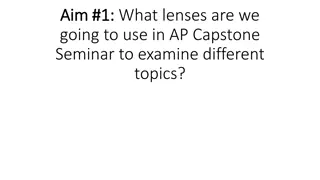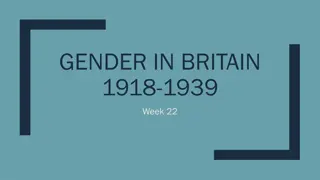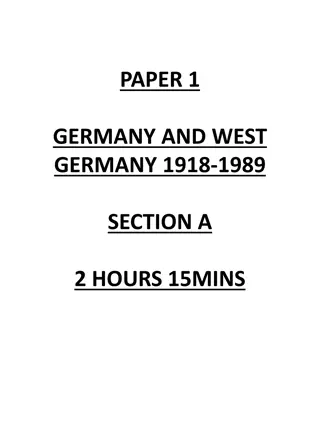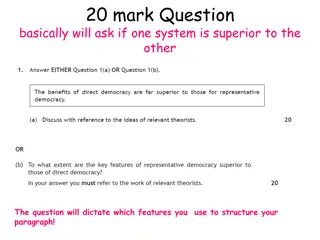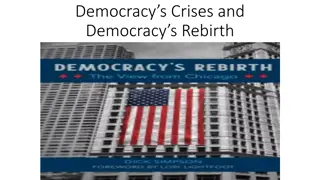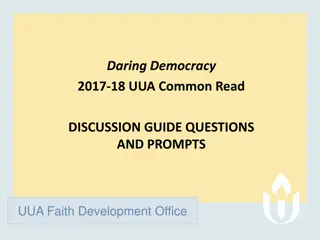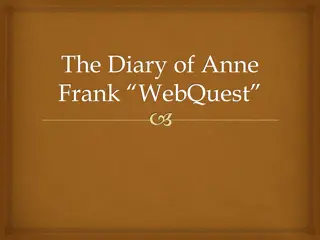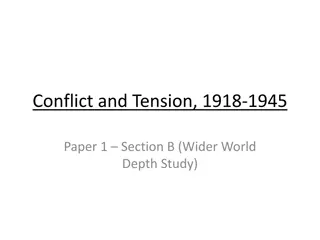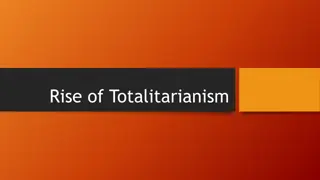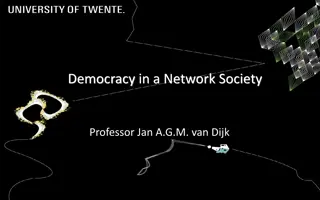Understanding Democracy and Nazism in Germany (1918-1945) - A Level History Depth Study
Delve into the complex history of Germany from 1918 to 1945, focusing on the transition from democracy to Nazism. Explore key events like the rise of the Nazi Party, Hitler's dictatorship, and the impact of World War Two. Challenge preconceived notions of good and evil while enhancing your analytical skills through in-depth study and critical thinking.
Download Presentation

Please find below an Image/Link to download the presentation.
The content on the website is provided AS IS for your information and personal use only. It may not be sold, licensed, or shared on other websites without obtaining consent from the author. Download presentation by click this link. If you encounter any issues during the download, it is possible that the publisher has removed the file from their server.
E N D
Presentation Transcript
AQA AQA- -A Level A Level Component 2: Depth Study Component 2: Depth Study 2O: Democracy and Nazism: Germany 1918-1945 Miss Allan
Introduction to History A Introduction to History A- -level As a History teacher, When are we doing the Nazis? is probably the question I get asked most by students and it s easy to see why. The events and horrors of Nazi controlled Germany during World War Two is a subject beloved of documentaries, films, TV programmes and authors. As students of History in a British school, a study of World War Two and the Nazi party paints a perfect opportunity for the British moral high ground allowing us to very firmly paint Britain as the good guys and Germans as the bad level- - Unit 2 Unit 2 But it s so much more complicated than this! Your A level depth study into Germany 1918-1945 will offer you the opportunity to do the Nazis in a completely different way to your previous learning. You will discover the long and complicated back story to Germany s successes and triumphs in the twentieth century. You will be encouraged to question and challenge your pre-existing ideas about good and evil and develop your complexity of thinking, writing, analysis and discussion by focusing on one of the most interesting and challenging periods of modern History.
AQA-A Level Component 2: Depth Study 2O: Democracy and Nazism: Germany 1918-1945 40 % of your A level History Final Exam at the end of Year 13: 2 hours 30 minutes 80 marks in total 3 questions
Final Exam Final Exam Section A: Assess the value of these sources to an Historian studying .. You will have 3 sources to write about & your own knowledge 30 marks in total Section B: Essay questions You will have a choice of 3 questions. You must answer 2 of them. 50 marks in total (25 per essay)
Our timeline Our timeline Year 12: Germany 1918- 1933: The Weimar Republic Year 13: Germany 1933- 1945: The Nazi Dictatorship
Key topics Key topics Year 12: Germany 1918- 1933: The Weimar Republic German defeat in World War One Peace-making and the Treaty of Versailles Establishing The Weimar Republic Economic, political and social problems in the Weimar Republic The Weimar Golden Age The Wall Street Crash The rise of the Nazi Party Hitler s rise to power
Key topics Key topics Year 13: Germany 1933- 1945: The Nazi Dictatorship Chancellor to Dictator Totalitarianism Nazi economic and social policies Racial ideology and Anti-Semitism The Holocaust The impact of World War Two
Getting started Getting started There are two key textbooks you ll use help you with this topic. You ll get these from school in September.
Getting started Getting started But in the meantime, there are a number of things you could read, watch or even listen to. There are some suggestions from the exam board in the attached document. Other suggestions include: The Book Thief Markus Zusak (there s also a film) https://www.youtube.com/watch?v=yMVy8_98I-o (Hitler: rise of evil) full film is on YouTube https://www.bbc.co.uk/programmes/p012wh9p (short introduction) https://www.history.org.uk/podcasts/categories/europe-modernaz (you can find some excellent reading and podcasts to listen to) https://www.bbc.co.uk/news/world-europe-17301646 (brief outline of German History)
Getting started Getting started Mrs Ashworth has sent a document with information about her A level topic, within that document she has given some guidance and advice about how to make notes. Please refer to this for any notes you make on the Germany topic too.
Getting started: key task 1 Getting started: key task 1 As well doing some reading and research around the topic using the guidance in the previous slides. Please could you also complete the following task and bring it into school in September. Step 1: Create a timeline on A3 paper which spans the entire time period of the topic (1918-1945) Step 2: On your timeline, plot on the key events with full dates and titles. (You can use the resources attached and included in this powerpoint to help you with this) Step 3: For each event, write a brief description of what happened and the consequences of it Step 4: In a separate colour, draw and annotate arrows explaining the connections between the events in your timeline how are key events/changes connected? Step 5: Counterfactual analysis is a key component of A Level study. For 5 of the events on your timeline, can you explain how history would have been different if this event had not occurred? Can you predict how your timeline might have looked different? What does this tell you about the importance of this event within this unit of work? Challenge: Can you now begin to explain the strengths and limitations of timelines? How far, and in what ways, will they be useful to you in studying the past?
Getting started: key task 2 Getting started: key task 2 As well doing some reading and research around the topic using the guidance in the previous slides. Please could you also complete the following task and bring it into school in September. Step 1: From your timeline, identify 5 key individuals (if in doubt, double check with Miss Allan to see if the people you have chosen are suitable). Step 2: For each of your individuals, complete the grid below, explaining the ways that they are significant (important) What do the actions and ideas of this individual reveal to us about the values and concerns of the time period in which they lived? In what ways was this individual's actions or ideas remarkable, both at the time and since? In what ways did the actions or ideas of this individual result in short or long term consequences? Why are the actions of this person remembered today and in the past? Step 3: Based uponyour grids, which of your individuals do you think was most significant and why? If you had to rank them into an order of significance, what would your criteria be for what makes an individual significant in the past?






